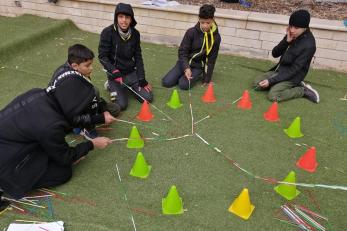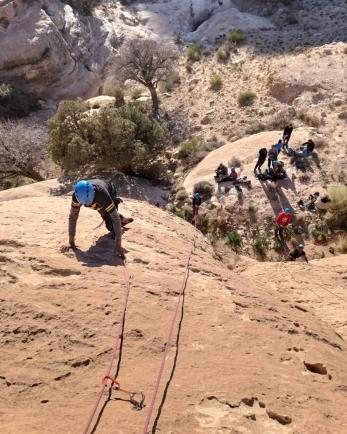Mercy Corps Nubader resumes its “life-changing” youth support program activities

It is not uncommon that in crises youth are most affected by social and economic deteriorating conditions, youth needs and ambitions can be easily overlooked by governments and non-state actors. The Amman Youth Declaration mentions how in times of conflict youth are perceived as main contributors to violent acts, while the government and society ought to consider the counteractive role youth can undertake in times of conflict. Moreover, the limited employment opportunities and fragmented access to education for all can contribute to youth economic isolation, political disillusionment and social unrest, which hinders social cohesion and development.
Given the high proportion of youth composition from the Jordanian society, of both Jordanians and Syrian refugees, it becomes a demographic imperative for decision-makers and non-state actors alike to improve the wellbeing of young people, build their skills and capabilities to find meaningful paths for their future, and become profoundly involved in advancing their communities.
Mercy Corps, through its pioneering “Nubader” program Supporting Resilient Youth and Communities in Jordan (SRYCJ) project, funded by the United Kingdom’s Foreign Aid, is attentively providing most at-risk youth of both Jordanians and Syrians with long-term solutions through support programs that can help them build their future, achieve self-actualization and contribute diligently to their communities.
During the last quarter of 2020, the Youth Support Program sessions resumed in both Irbid and Russaifeh with a total of 124 participants and encompassed engaging topics such as problem solving and cooperation, effective communication, identifying feelings and warning signs, and emotional awareness. To date, a total of 26 support group sessions have been implemented across both sites.

The support group sessions are geared towards taking youth on a journey of self-discovery, where they are being equipped with various skills and tools that will stimulate their emotional, cognitive, and social development. Through discussions and activities, the youth are learning to recognize their strengths, interests, and values. Additionally, they will learn to label, manage, and regulate difficult emotions such as anger and sadness. The team of youth workers will help youth navigate the difficult period of adolescence that is filled with many physical, emotional, and cognitive changes, and equip them with various tools to cope with stressors and solve problems effectively.
By the end of the program a total of 135 youth will have benefited from Nubader program learning sessions and activities from Irbid, Ruseifeh and Madaba governorates.

Beginning in January 2021, 10 youth were interested and enrolled in the Post-Care Program designed for most at-risk youth aged 15 to 17 and are released from rehabilitation centers, based on outreach efforts of Mercy Corps Nubader team. This program adopts the Nature Club model, through engaging youth in intensive outdoor activities; the approach distances young people from the stress of their immediate environments and provides them with psychosocial support, social bonding, and self-actualization skills. By the end of program activities, youth participants will have improved their emotional wellbeing, social reintegration, gained greater educational attainment, and improved their employability skills.